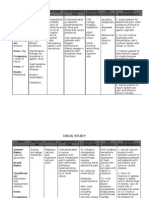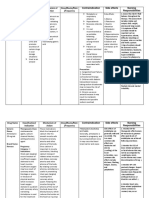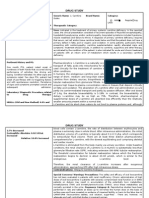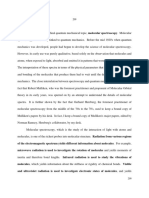0 ratings0% found this document useful (0 votes)
278 viewsActivated Charcoal
Activated Charcoal
Uploaded by
Supreeth PrasadActivated charcoal is an absorbent powder that binds to toxins and medications in the gastrointestinal tract, preventing absorption. It is used to treat oral poisonings and overdoses by forming a complex with the ingested substance that is then excreted in the feces. While it may cause nausea, vomiting, constipation, or diarrhea, activated charcoal effectively treats many oral toxic ingestions when administered as a slurry by mouth within an hour of exposure.
Copyright:
© All Rights Reserved
Available Formats
Download as PDF, TXT or read online from Scribd
Activated Charcoal
Activated Charcoal
Uploaded by
Supreeth Prasad0 ratings0% found this document useful (0 votes)
278 views1 pageActivated charcoal is an absorbent powder that binds to toxins and medications in the gastrointestinal tract, preventing absorption. It is used to treat oral poisonings and overdoses by forming a complex with the ingested substance that is then excreted in the feces. While it may cause nausea, vomiting, constipation, or diarrhea, activated charcoal effectively treats many oral toxic ingestions when administered as a slurry by mouth within an hour of exposure.
Original Description:
Activated Charcoal Info
Copyright
© © All Rights Reserved
Available Formats
PDF, TXT or read online from Scribd
Share this document
Did you find this document useful?
Is this content inappropriate?
Activated charcoal is an absorbent powder that binds to toxins and medications in the gastrointestinal tract, preventing absorption. It is used to treat oral poisonings and overdoses by forming a complex with the ingested substance that is then excreted in the feces. While it may cause nausea, vomiting, constipation, or diarrhea, activated charcoal effectively treats many oral toxic ingestions when administered as a slurry by mouth within an hour of exposure.
Copyright:
© All Rights Reserved
Available Formats
Download as PDF, TXT or read online from Scribd
Download as pdf or txt
0 ratings0% found this document useful (0 votes)
278 views1 pageActivated Charcoal
Activated Charcoal
Uploaded by
Supreeth PrasadActivated charcoal is an absorbent powder that binds to toxins and medications in the gastrointestinal tract, preventing absorption. It is used to treat oral poisonings and overdoses by forming a complex with the ingested substance that is then excreted in the feces. While it may cause nausea, vomiting, constipation, or diarrhea, activated charcoal effectively treats many oral toxic ingestions when administered as a slurry by mouth within an hour of exposure.
Copyright:
© All Rights Reserved
Available Formats
Download as PDF, TXT or read online from Scribd
Download as pdf or txt
You are on page 1of 1
Activated Charcoal
Classification: Absorbent, Antidote
Mechanism of Action: Activated charcoal is a fine black powder
And adsorbs ingested toxins. Once the drug binds to the activated charcoal, the combined
complex is excreted in the feces.
Indications: Many oral poisonings and medication overdoses
Adverse Side Effects: May indirectly induce nausea and vomiting. May cause constipation or
mild, transient diarrhea.
Contraindications: Corrosives, caustics, petroleum distillates,
Dosage: 1 g/kg, Prepared in a slurry and administered PO.
Special Considerations: may blacken feces. Must be stroed in closed container. Does not absorb
all drugs and toxic substances. (eg. Phenobarbital, aspirin, cyanide, lithium, iron, lead and
arenic).
Pregnancy Class - C
Onset of Action: Immediate
Duration: Continual while in gastrointestinal tract; reaches equilibrium once saturated
Reference(s):
You might also like
- SalbutamolDocument2 pagesSalbutamolMarck Vincent Garcia OngNo ratings yet
- Drug StudyDocument3 pagesDrug StudyMarychen Cabunas100% (1)
- Amiodarone (PACERONE)Document1 pageAmiodarone (PACERONE)Amanda CoadNo ratings yet
- Vasotec EnalaprilDocument1 pageVasotec EnalaprilCassie100% (1)
- Generic Name: Brand Name:: ClassificationsDocument2 pagesGeneric Name: Brand Name:: ClassificationsbillyktoubattsNo ratings yet
- DigoxinDocument4 pagesDigoxinJaessa FelicianoNo ratings yet
- LacipilDocument2 pagesLacipilianecunarNo ratings yet
- Metronidazole 500mg/tab 1 Tab 3xadayDocument4 pagesMetronidazole 500mg/tab 1 Tab 3xadayCrisyl LipawenNo ratings yet
- Drug Study OrthoDocument4 pagesDrug Study OrthoJhessa Curie Pitagan100% (1)
- Drug Study QIDocument8 pagesDrug Study QImaeDonitaNo ratings yet
- Drug StudyDocument9 pagesDrug StudyJonica CamposNo ratings yet
- Dextrose 50 InjectionDocument6 pagesDextrose 50 InjectionLip StickNo ratings yet
- TramadolDocument2 pagesTramadolAllen Vincent Cauton TulaganNo ratings yet
- Document DRUG 4Document4 pagesDocument DRUG 4Linda AdamsonNo ratings yet
- Atropine SulfateDocument1 pageAtropine SulfateTrishaaMayolNo ratings yet
- BETAXOLOLDocument2 pagesBETAXOLOLjulieNo ratings yet
- Drug StudyDocument6 pagesDrug StudymichpaduaNo ratings yet
- Drug StudyDocument5 pagesDrug Studyjanelle123 toribioNo ratings yet
- Cebu Normal University: Drug StudyDocument2 pagesCebu Normal University: Drug StudyGwen Marie Taboada100% (1)
- Drug Study ValiumDocument2 pagesDrug Study ValiumRhea Liza Comendador-TjernmoenNo ratings yet
- Generic Name: Brand Name: Pletal: Pharmacologic Class: Pharmacokinetics General Indications Contraindications BeforeDocument2 pagesGeneric Name: Brand Name: Pletal: Pharmacologic Class: Pharmacokinetics General Indications Contraindications Beforeart_mutantNo ratings yet
- DRUG LactuloseDocument1 pageDRUG LactuloseJona Phie Domingo MonteroNo ratings yet
- Nahco3 Vancomycin AmlodipineDocument3 pagesNahco3 Vancomycin AmlodipineShan Dave TupasNo ratings yet
- New DS3Document3 pagesNew DS3dakieNo ratings yet
- Drug Study RopivacaineDocument2 pagesDrug Study Ropivacainerica sebabillonesNo ratings yet
- Drug Study of Mannitol RMCDocument1 pageDrug Study of Mannitol RMCAdrian Ardamil0% (1)
- AdenosineDocument2 pagesAdenosinegovind_soni_150% (1)
- Drug Study of ChloramphenicolDocument3 pagesDrug Study of Chloramphenicolcasimir1128No ratings yet
- Drug StudyDocument4 pagesDrug StudyhsiriaNo ratings yet
- Tramadol Hydrochloride (Ultran, Ultracet)Document1 pageTramadol Hydrochloride (Ultran, Ultracet)Rye AnchNo ratings yet
- Drug StudyDocument6 pagesDrug Studyjay kusainNo ratings yet
- DRUG StudyDocument6 pagesDRUG Studytzuquino Emz80% (5)
- Telmisartan, ISMNDocument8 pagesTelmisartan, ISMNDenise EspinosaNo ratings yet
- BretyliumDocument4 pagesBretyliumButchay LumbabNo ratings yet
- NeoblocDocument2 pagesNeoblocianecunar100% (2)
- Generic Name:: ClassificationsDocument4 pagesGeneric Name:: ClassificationsbillyktoubattsNo ratings yet
- IbuprofenDocument3 pagesIbuprofenapi-3797941100% (1)
- Drug StudyDocument1 pageDrug StudycliffordbuenoNo ratings yet
- Drug Study Vit B ComplexDocument2 pagesDrug Study Vit B Complexbekbekk cabahugNo ratings yet
- Docu - Tips Drug StudyDocument14 pagesDocu - Tips Drug StudyArdel LabadaNo ratings yet
- Drug StudyDocument15 pagesDrug StudyDavid RefuncionNo ratings yet
- Drug StudyDocument8 pagesDrug Studyzbestgurl100% (1)
- Drug Study - VancomycinDocument2 pagesDrug Study - VancomycinKhatlen BagaresNo ratings yet
- Drug Study For FractureDocument4 pagesDrug Study For FractureitsmeayaNo ratings yet
- EsomeprazoleDocument1 pageEsomeprazoleamaliea234No ratings yet
- Drugstudy OrsdDocument10 pagesDrugstudy OrsdRafmar A. SalundaguitNo ratings yet
- Drug Study InsulinDocument2 pagesDrug Study InsulinGrant Kenneth Dumo AmigableNo ratings yet
- Drug StudyDocument2 pagesDrug StudygayskieNo ratings yet
- Magnesium Oxide (Antacid, Anti-Convulsant, Electrolyte, Laxative)Document1 pageMagnesium Oxide (Antacid, Anti-Convulsant, Electrolyte, Laxative)Danielle Marie SamblacenoNo ratings yet
- Drug StudyDocument17 pagesDrug StudyTherese ArellanoNo ratings yet
- DolcetDocument2 pagesDolcetmarc_hansen_1312No ratings yet
- Drug Study: San Francisco St. Butuan City 8600, Region XIII Caraga, PhilippinesDocument2 pagesDrug Study: San Francisco St. Butuan City 8600, Region XIII Caraga, PhilippinesNikki Caryl ZafraNo ratings yet
- Sodium BicarbonateDocument1 pageSodium BicarbonateALbinong VelascoNo ratings yet
- The Ride of Your Life: What I Learned about God, Love, and Adventure by Teaching My Son to Ride a BikeFrom EverandThe Ride of Your Life: What I Learned about God, Love, and Adventure by Teaching My Son to Ride a BikeRating: 4.5 out of 5 stars4.5/5 (2)
- DrugsssDocument3 pagesDrugsssLindy JaneNo ratings yet
- AntidotesDocument82 pagesAntidoteskhojalkhelNo ratings yet
- Poisoning and ManagementDocument53 pagesPoisoning and ManagementYusuf Nawaz KhanNo ratings yet
- Drugs For Diarrhea and ConstipationDocument24 pagesDrugs For Diarrhea and ConstipationFaddi BoyNo ratings yet
- ToxicologyDocument13 pagesToxicologylitan dasNo ratings yet
- GENERAL LINE of Treatment UREA AMMONIA SALT - poISONINGDocument49 pagesGENERAL LINE of Treatment UREA AMMONIA SALT - poISONINGSunil0% (1)
- Math 300 PrefacetoStudentDocument1 pageMath 300 PrefacetoStudentSupreeth PrasadNo ratings yet
- Chem 310 CH 19 S18Document28 pagesChem 310 CH 19 S18Supreeth PrasadNo ratings yet
- 1quantumchemical Electronegativity and Hardness IndicesDocument16 pages1quantumchemical Electronegativity and Hardness IndicesSupreeth PrasadNo ratings yet
- Fall 2017 Syllabus - Introduction To Psychological ScienceDocument6 pagesFall 2017 Syllabus - Introduction To Psychological ScienceSupreeth PrasadNo ratings yet































































